Hands-on trainings, in-person meetings and charting current practices: throughout 2023, CHARM-EU partners carry out pilots to test how the first joint strategies developed within their R&I project can be fine-tuned and implemented. Learn more about how TORCH promotes enhanced collaboration and knowledge sharing through these actions.
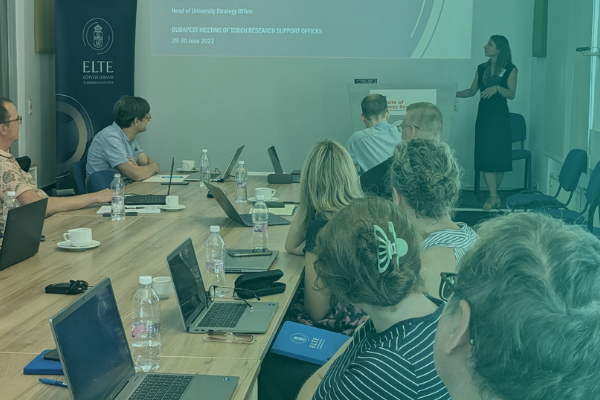
Since its inception in 2021, TORCH is building up the R&I dimension of CHARM-EU. During the first half of the project, partners performed a landscape analysis and identified gaps regarding cross cutting principles (inter- and transdisciplinarity, research ethics and integrity, gendered innovation) and transformational modules such as developing a Common R&I Agenda, cooperating with non-academic actors, mainstreaming open science and engaging the public through citizen science (WPs 3-7).
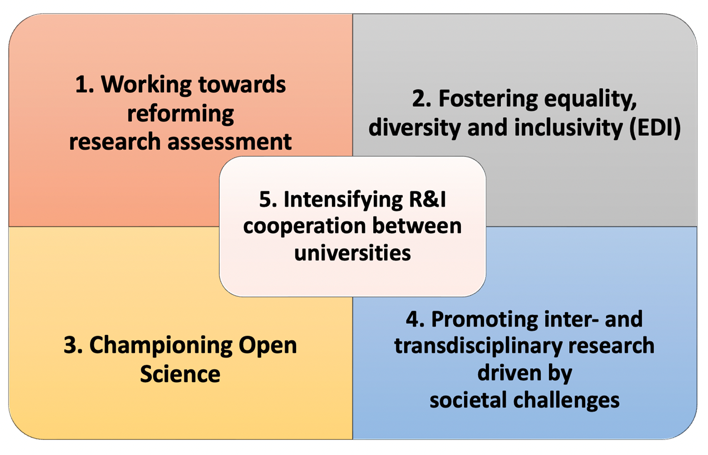
The results of the scoping activities helped TORCH and the CHARM-EU leadership to outline common mid- and long-term strategic goals for the Alliance and the experts working on establishing Common Policies and Strategies (WP8) identified five priority areas. These strategic goals and priorities serve as the basis of the piloting activities that Work Package 9 on Action Plans and Pilots is carrying out in 2023.
Building on the preparatory work from the last 2 years, WP9 experts designed seven pilot activities with a potential of enriching partner universities while contributing to the R&I architecture of CHARM-EU. The purpose of the pilots is to test strategies through the close and structured cooperation of the Alliance members, contributing to the fine-tuning of strategies, potentially bridging CHARM-EU’s first common R&I efforts to future collaborations. The implementation of the pilots started in March 2023 following the 2nd TORCH Annual Forum organized in Dublin.
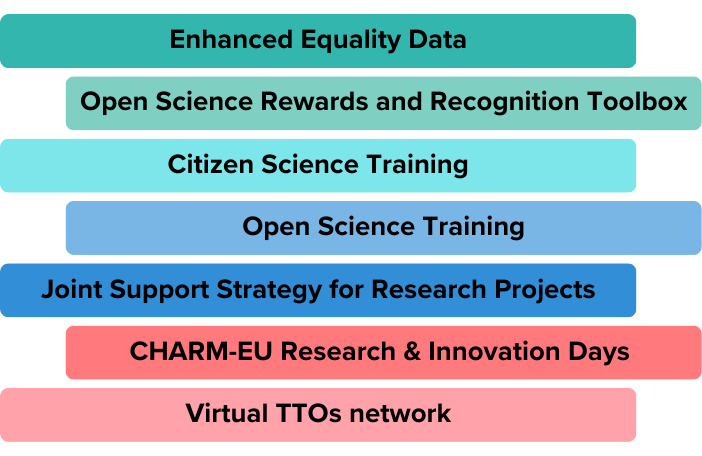
The CHARM-EU Open Science Day organized online by ELTE and TCD on 9 June connecting to the Open Science Training pilot was one of the first tangible pilot actions. The morning sessions focused on the topic of how university leadership can promote Open Science culture while the afternoon section provided ready-to-use knowledge to researchers and staff members. The importance of the training was highlighted by the significant interest in the event: out of the 118 registrations from 14 countries, more than 75 people participated in at least one of the sessions. Building on the experiences of this first training and a presential one planned for autumn, the Pilot Team will develop and fine-tune a training plan that can become an integrated part of university practices.
Meanwhile, another Pilot Team coordinated by UB is working on a certified Citizen Science Training programme. With the official support of UB’s Institute of Lifelong Learning and in collaboration with Citizen Science NOW and La Taula del Tercer Sector (an association uniting civil society organizations in Catalonia), the team is developing the training modules and new resources that will be piloted during a course in November 2023.
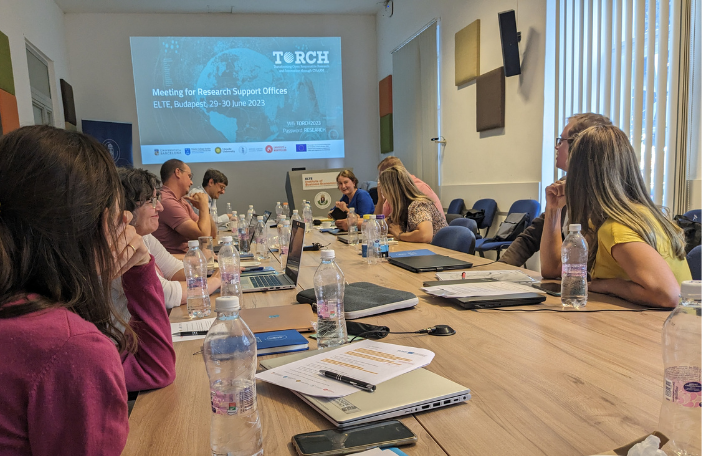
As part of the Joint Support Strategy for Research Projects pilot, representatives of CHARM-EU partners’ Research Support Offices were meeting between 29-30 June at ELTE in Budapest to share experiences and discuss the possibilities of a joint support strategy for common research projects. Colleagues coming from the partner universities presented their respective units and research support structures, shared their experiences on collaboration with other offices, participated in a training session on inter- and transdisciplinary research management delivered by Senior IDR Funding Specialist Doireann Wallace (TCD) as well as in several roundtables focusing on the challenges of cooperation with different ITD stakeholders.
Besides planning long-term collaboration in supporting research projects, the member universities of CHARM-EU are continuously providing various kinds of support to those research groups that emerged from WP4 in the first half of the project. Some of the research proposals drafted in that period were further developed in late 2022 and early 2023 have already been or will be submitted to various European calls.
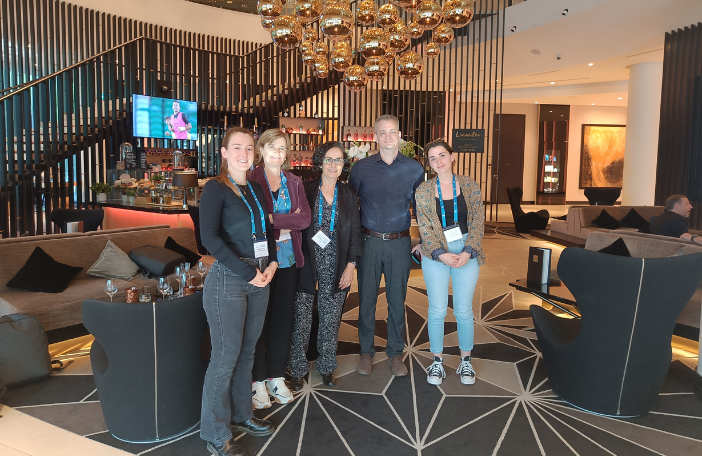
In addition to the meeting of Research Support Offices, representatives of the local Technology Transfer Offices also had the opportunity to meet, exchange good practices and learn more about knowledge transfer during the ASTP Annual Conference hosted in Tallinn, Estonia. The meetings of TTO officers are part of the Virtual TTOs’ Network pilot coordinated by UM, aiming to connect the TTOs of the partner universities in order to discuss insights, best practices and tools.
Connected to the Priority Area of fostering equality, diversity and inclusivity, the Pilot Team working on Enhanced Equality Data has designed a questionnaire to chart current data collection practices on equality and diversity in CHARM-EU institutions with the help of EDI colleagues in TCD. Following revision, the survey was circulated within the member institutions. The aim of the team is to develop a matrix of data collection practices and provide recommendations.
The organization of the first CHARM-EU Research & Innovation Days as a pilot event has also started, the first R&I Days will focus on a theme central to the CHARM-EU Alliance: the topic of water and the global challenges connected to it. The hybrid event will take a clear interdisciplinary approach targeting researchers and practitioners from multiple disciplines and fields as well as research support staff and other stakeholders.

Last but not least, the Alliance has established the CHARM-EU Open Science Recognition Award as part of the Open Science rewards and recognition toolbox pilot. The aim of this award is to recognize individuals who have demonstrated a strong commitment to Open Science: submissions are open to all teachers and researchers from the CHARM-EU partner universities until 15 September 2023. Within this same pilot, the team has collected existing practices through a survey that will be analysed and utilised for the preparation of the Open Science toolbox.
Pilots and Action Plans for building long-term collaboration
To summarize the importance of the ongoing actions, while the pilot year of 2023 is a great opportunity to test and fine-tune strategies developed so far, these pilots could also help laying the foundations of the future collaboration of the founding members and the joining institutions on the field of research and innovation. Besides piloting, WP9 is also developing Action Plans, which are pilot actions meant to be carried out in a longer period, outside the scope of this project but within the framework of the CHARM-EU Alliance